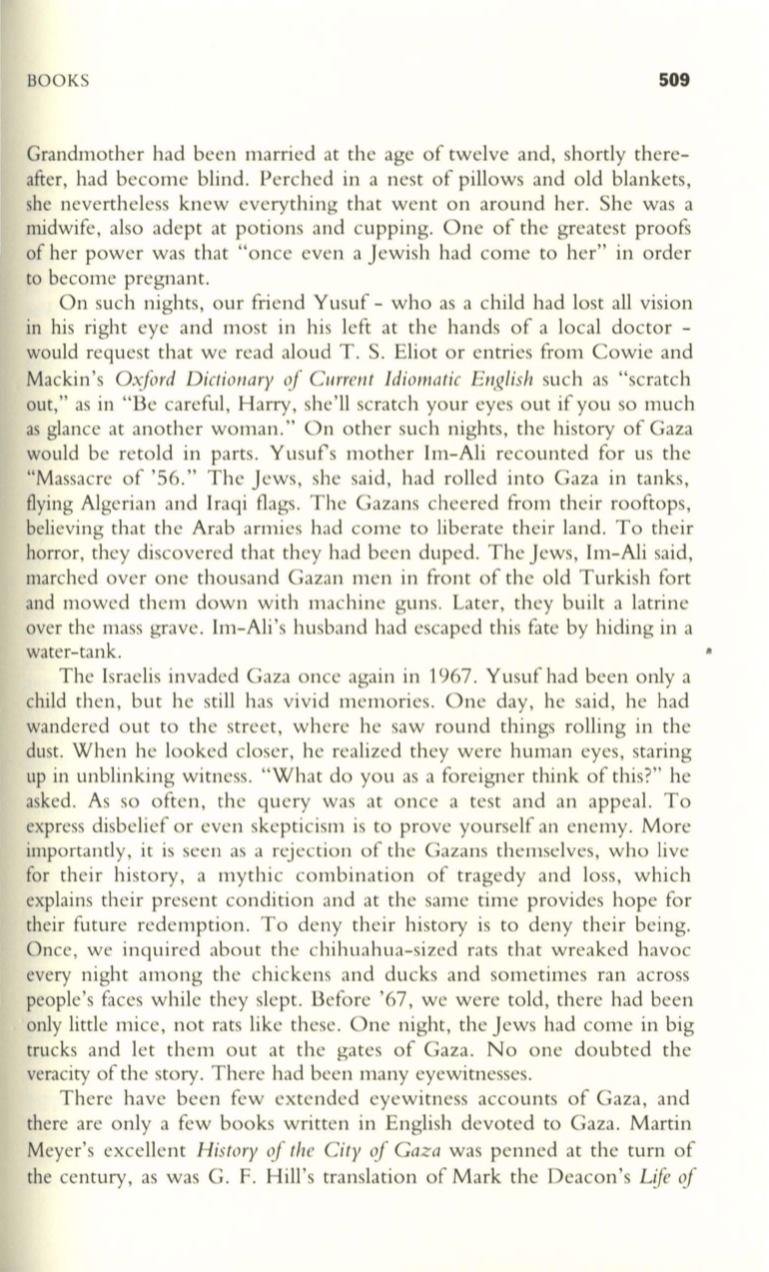
BOOKS
509
Grandmother had been married at the age of twelve and, shortly there–
after, had become blind. Perched in a nest of pillows and old blankets,
she nevertheless knew everything that went on around her. She was a
midwife, also adept at potions and cupping. One of the greatest proofs
of her power was that "once even a Jewish had come to her" in order
to become pregnant.
On such nights, our friend Yusuf - who as a child had lost all vision
in his right eye and most in his left at the hands of a local doctor -
would request that we read aloud
T.
S. Eliot or entries from Cowie and
Mackin's
Oxford Dictionary of Current Idiomatic English
such as "scratch
out," as in "Be careful, Harry, she'll scratch your eyes out if you so much
as glance at another woman." On other such nights, the history of Gaza
would be retold in parts. Yusufs mother 1m-Ali recounted for us the
"Massacre of '56." The Jews, she said, had rolled into Gaza in tanks,
flying Algerian and Iraqi flags. The Gazans cheered from their rooftops,
believing that the Arab armies had come to liberate their land. To their
horror, they discovered that they had been duped. The Jews, 1m-Ali said,
marched over one thousand Gazan men in front of the old Turkish fort
and mowed them down with machine guns. Later, they built a latrine
over the mass grave. 1m-Ali's husband had escaped this fate by hiding in a
water-tank.
The Israelis invaded Gaza once again in 1967. Yusuf had been only a
child then, but he still has vivid memories. One day, he said, he had
wandered out to the street, where he saw round things rolling in the
dust. When he looked closer, he realized they were human eyes, staring
up in unblinking witness. "What do you as a foreigner think of this?" he
asked. As so often, the query was at once a test and an appeal. To
express disbelief or even skepticism is to prove yourself an enemy. More
importantly, it is seen as a rejection of the Gazans themselves, who live
for their history, a mythic combination of tragedy and loss, which
explains their present condition and at the same time provides hope for
their future redemption. To deny their history is to deny their being.
Once, we inquired about the chihuahua-sized rats that wreaked havoc
every night among the chickens and ducks and sometimes ran across
people's faces while they slept. Before '67, we were told, there had been
only little mice, not rats like these. One night, the Jews had come in big
trucks and let them out at the gates of Gaza. No one doubted the
veracity of the story. There had been l1uny eyewitnesses.
There have been few extended eyewitness accounts of Gaza, and
there are only a few books written in English devoted to Gaza. Martin
Meyer's excellent
History of the City of Gaza
was penned at the turn of
the century, as was G. F. Hill's translation of Mark the Deacon's
Life
of


